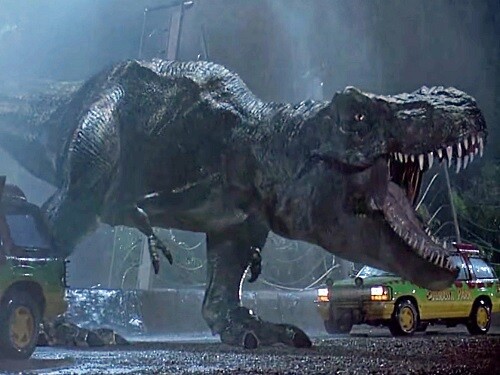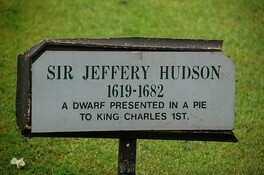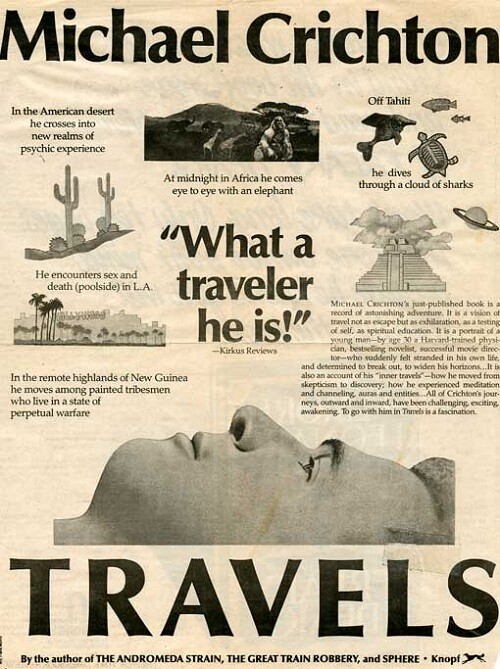4 Ways Jurassic Park's Writer Was A Giant Weirdo

Michael Crichton is the foremost writer in the "unusual theme park goes off the rails" subgenre of fiction, having created both Jurassic Park and Westworld. But his fascination with park workers being gruesomely murdered wasn't the weirdest thing about him -- not when there are other strong contenders for that title, like the fact that ...
He Once Plagiarized Orwell To Make A Point
On top of writing over two dozen novels, Michael Crichton also wrote movies like Twister, the disaster flick in which Bill Paxton fights a sharknado made of wind. Soon after the movie came out, Crichton and his wife/co-writer Anne-Marie Martin (of '70s Doctor Strange TV movie fame) were sued by another author who claimed they'd stolen the idea from him. Crichton ended up winning the case, but in the process, he was forced to confess under oath that he had previously ripped off another author: George Orwell, although Crichton insists he only did it for science.

Universal Pictures
Actually, if you're picturing Nineteen Eighty-Four with robot cowboys or Animal Farm with dinosaurs, we regret to inform you that it was something far less exciting. While studying literature at Harvard, Crichton kept getting C grades on his writing assignments and started thinking his professor had it in for him. So, he "decided to make an experiment." When tasked with writing about Gulliver's Travels, Crichton remembered reading an essay on the subject by Orwell and re-typed the whole thing and submitted it under his name, which was way easier to get away with before Google existed. In fact, it's estimated that 63% of all college papers at the time were just Orwell's essay on Gulliver's Travels under different titles.
So did the experiment work? Sort of: Orwell's essay got a B-, which isn't great for a literary master, but it's still better than Crichton's usual grades. Still, Crichton decided that if Orwell could get a B- at Harvard, then the English department was way too hard for him, so he switched to anthropology with some premed courses. He ended up going into Harvard's med school and becoming a doctor, which was apparently easier than learning to write passable essays.
He Took The Name Of A Famous Historical Dwarf
When we say Crichton was a giant weirdo, we mean that literally: dude was 6'9". Some people looked at him with the same awe that Sam Neill looked at that brachiosaurus. Who knows, maybe he even performed the motion capture.
Although Crichton says that his height made him feel like an outcast when he was a kid, he had a sense of humor about it later in life. An example of that is one of the fake names he picked when he decided to start writing novels while still intending to be a doctor (reasoning that patients would be less likely to tell him about their anal warts if they thought they might end up in a book). Crichton's most common pseudonym was "John Lange," but he also wrote one book as "Jeffrey Hudson" -- a sarcastic reference to Captain Jeffery "Lord Minimus" Hudson, a 17th-century dwarf who has been described as the real-life Tyrion Lannister.

Hudson was known as the "Queen's Dwarf" because he was gifted to Queen Henrietta Maria of England as an amusing curiosity when he was 7 years old and 18 inches high. "Gifting" a child to someone for entertainment is bad enough, but the way it happened was even more undignified: he was "served" to queen and king in a pie from which he burst out wearing a tiny knight's armor.
Hudson lived with the Queen until his 20s when England broke out into one of its periodic civil wars. It's been reported that he served at the Royalist side and was named "Captain of Horse." After that, he lost his patience for prancing around for the Queen and her hangers-on and challenged anyone who mocked him to a duel. One time, his opponent showed up with a water sprinkler (basically, a Medieval Super Soaker) thinking he'd get a good laugh. Hudson showed up with a real gun and shot him dead.
Killing high society members was somewhat frowned upon at the time, so Hudson was exiled and ended up being kidnapped by pirates and forced into slavery in North Africa. He managed to escape and make his way back to England 25 years later, by which point he'd grown to 45 inches. Not a whole lot is known about his final years except for the fact that he received two mysterious payments from the Secret Service. Unfortunately, whatever mission he carried out to earn that money was considered less noteworthy than his past as pie stuffing by whoever wrote his epitaph:

Historians speculate that he ... uhh, wait, wasn't this article supposed to be about some freakishly tall writer or something? Okay, back to the Tom Clancy facts!
He Thought He Had Mind Powers
Crichton's second most fantastic work is Travels, a (purportedly) non-fiction book in part devoted to the quest for mystical enlightenment he embarked upon once he became rich enough to blow money on stuff like that.

Crichton writes that he actually learned how to move his mind out of his body and wander around the house when he was a kid, but he thought that was something everyone could do. As an adult, he experimented with astral travel and said he once saw his grandma's ghost but "didn't feel any particular need to talk to her," so he just waved like they'd run into each other at the supermarket. He did, however, hug his father (a man he described as "a first-rate son of a bitch" who beat his sister).
Crichton also claimed he had a psychic encounter with a "Walt Disney devil" that was stuck to him. At first, he was worried he was possessed and consulted an expert to get rid of it, but then it turned out he'd created the psychic cartoon devil as a kid to protect himself from his abusive father and school bullies. Crichton was deeply thankful to the demonic entity but still informed him his services were no longer needed and bid him an emotional adieu. Here's a dramatization of that moment:
Crichton was also convinced that he could read people's auras, see the future, psychically communicate with plants (or at least one cactus in particular), and seriously believed he could bend spoons with his mind. Please keep that in mind as you read the next entry.
He Was A Climate Change Denialist (To Dickish Extremes)
Why is Travels only Crichton's second most fantastic work? Because the first one is State of Fear, the techno-thriller where he claims that climate scientists are in cahoots with eco-terrorists to manufacture disasters and fool the world into believing that global warming is real. Just so no one would think this was satire, the book ends with a long section where Crichton addresses the reader directly to say that no, this was pretty much what he believed.
He also delivered several impassioned speeches on this subject. We'd embed one now, but we don't want to pollute your YouTube recommendations with anti-science trash, so here's another random South Park clip.
Of course, the overwhelming majority of experts agree that Crichton's "evidence" against climate change makes no sense, but he saw that as a badge of pride -- he was highly critical of letting something as trivial as scientific consensus guide policy. In other words, he thought that one study saying that the planet isn't getting warmer is significant, but 999 studies saying the opposite aren't.
How fanatical was Crichton about this position? We'll let this anecdote illustrate that: when Michael Crowley, a Washington-based political journalist who went to Yale, wrote a detailed takedown of State of Fear, Crichton responded by including a child rapist character in his next book called Mick Crowley, who happens to be a Washington-based political journalist who went to Yale ... and has a small penis.
On the other hand, the oil industry loved the book and gave Crichton the American Association of Petroleum Geologists 2006 Journalism Award. Sadly, Crichton passed away before he could write a book about how every single oil executive in America has a monster dong.
Follow Maxwell Yezpitelok's heroic effort to read and comment on every '90s Superman comic at Superman86to99.tumblr.com.
Top image: Alfred A. Knopf